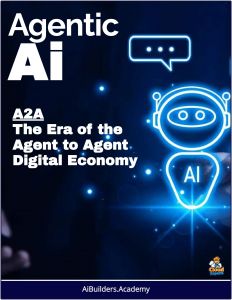Microsoft: Millions of Ai Agents are Coming!
Microsoft's vision and product strategy for enabling businesses to harness Agentic AI centers on transforming business operations by integrating intelligent, autonomous AI agents into everyday workflows.
 From 19m:00s in his keynote talk Satya Nadella describes how ‘Agents’ are central to their vision for AI in the Enterprise.
From 19m:00s in his keynote talk Satya Nadella describes how ‘Agents’ are central to their vision for AI in the Enterprise.
AI agents, also known as virtual assistants or chatbots, are intelligent software programs that can perform tasks, answer questions, and provide personalized recommendations.
Microsoft envisions AI agents as powerful tools that can assist users in various domains, from customer service to healthcare, which they define in this Tech Community article as:
Agentic AI Systems are designed to resolved complex problems with limited direct human supervision [1]. These systems are composed of multiple conversable agents that converse with each other and can be orchestrated centrally or self-organize in a decentralized manner
The company aims to empower organizations to boost productivity, optimize processes, and unlock new value by leveraging AI that can reason, act independently, and orchestrate complex tasks with minimal human oversight. This vision is rooted in Microsoft’s broader mission to empower every person and organization to achieve more, with Agentic AI positioned as a pivotal tool for reimagining business processes and driving competitive advantage.
Vision: An AI-Powered, Agentic World
Microsoft envisions a future where businesses operate within an “agentic world,” characterized by a constellation of AI agents—ranging from simple prompt-and-response systems to fully autonomous entities. These agents work individually or collaboratively to enhance productivity, streamline operations, and enable employees to focus on high-value, strategic tasks.
The company sees agents as the “new apps” for an AI-driven era, capable of acting on behalf of individuals, teams, or entire functions. This shift is intended to move organizations from legacy systems to AI-first business processes, delivering immediate return on investment while future-proofing operations.
Key to this vision is scalability and accessibility. Microsoft aims to democratize Agentic AI, making it as intuitive to create and use as a spreadsheet or presentation. By embedding these capabilities across its ecosystem—spanning Microsoft 365, Azure, Dynamics 365, and beyond—Microsoft seeks to ensure that businesses of all sizes can harness AI agents tailored to their specific needs, whether for employee productivity, customer engagement, or operational efficiency.
Product Strategy: Tools and Platforms for Agentic AI
Microsoft’s product strategy revolves around a robust, integrated technology stack that supports the development, deployment, and management of Agentic AI. Here’s how it unfolds:
Copilot Studio as the Agentic Hub
Copilot Studio is a cornerstone of Microsoft’s strategy, evolving into a comprehensive, no-code/low-code platform for building autonomous agents. It allows businesses to create agents that draw on enterprise data (e.g., Microsoft 365 Graph, Dataverse, Fabric) and connect to external systems.
In November 2024, Microsoft expanded Copilot Studio’s capabilities, moving autonomous agent creation from private to public preview, enabling broader adoption. These agents can handle tasks like lead generation, customer service inquiries, or supply chain automation, with guardrails such as human approval for critical actions to mitigate risks like hallucinations.
Dynamics 365 and Pre-Built Agents
Microsoft is embedding Agentic AI directly into its Dynamics 365 suite, introducing pre-configured autonomous agents to enhance sales, service, finance, and supply chain functions. Examples include the Sales Qualification Agent, which prioritizes leads and drafts personalized outreach, and the Supplier Communications Agent, which monitors supply chain performance and responds to disruptions.
These agents, launched in late 2024, aim to deliver immediate value while serving as templates for customization, with more agents planned for release throughout 2025.
Azure AI as the Backbone
Azure provides the infrastructure and AI models powering Agentic AI. The Azure AI Agent Service, alongside the Azure AI Foundry, offers developers a code-first environment to design and deploy secure, stateful agents.
Businesses can leverage Azure’s catalog of over 1,800 large language models (LLMs)—including options beyond OpenAI’s models—to customize agents for specific use cases. Enhanced Retrieval-Augmented Generation (RAG) and knowledge-tuning capabilities ensure agents are grounded in enterprise data, improving accuracy and relevance.
Microsoft 365 Integration
Within Microsoft 365, Copilot serves as the interface for interacting with agents, while the Microsoft 365 Agents SDK enables developers to publish agents across channels like Teams or the web.
This integration ensures agents are seamlessly embedded in tools employees already use, enhancing knowledge discovery, task automation, and workflow orchestration. For example, autonomous agents can summarize meetings, draft reports, or manage employee onboarding, freeing up time for creative work.
Multi-Modal and Industry-Specific Solutions
Microsoft is expanding Agentic AI beyond text to multi-modal capabilities, such as analyzing images or supporting voice interactions (e.g., in contact center IVRs). This allows businesses to deploy agents for diverse scenarios, like billing support where customers upload documents for analysis. Industry-specific innovations, like Toyota’s “O-Beya” system with nine specialized agents for engineering, illustrate how Microsoft tailors Agentic AI to sectoral needs.
Enabling Businesses: Practical Outcomes and Guardrails
Microsoft’s strategy emphasizes tangible business outcomes—cost savings, revenue growth, and efficiency gains—over raw compute metrics, with pricing models based on messages exchanged rather than tokens. Companies like Pets at Home (profit protection), McKinsey (client onboarding), and Fujitsu (sales proposals) showcase real-world impact, with productivity boosts ranging from 30% to 67%.
To ensure trust and adoption, Microsoft incorporates responsible AI principles, including data loss prevention, encryption, and transparency in agent decision-making, addressing challenges like hallucinations or unintended actions.
Competitive Edge and Ecosystem Play
By leveraging its dominance in enterprise productivity (e.g., Office 365’s hundreds of millions of users) and Azure’s cloud infrastructure, Microsoft positions itself ahead of competitors like Salesforce (Agentforce) or ServiceNow.
Its partnership with OpenAI, combined with an open approach to third-party LLMs, strengthens its ecosystem, while empowering partners and developers to extend Agentic AI further solidifies its market reach.
In summary, Microsoft’s vision is to make Agentic AI a transformative force for businesses, supported by a product strategy that integrates scalable, secure, and user-friendly tools across its platforms. This approach aims to turn AI from a buzzword into a practical, pervasive asset for modern enterprises.



